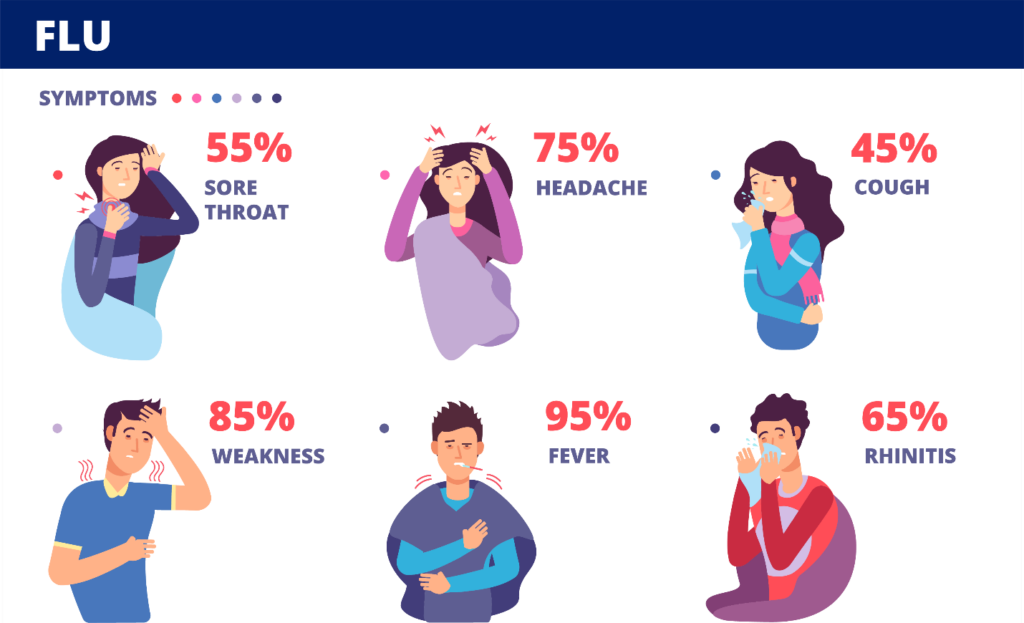
When it comes to the flu vaccine, there are decisions to make. As a community healthcare provider, we are often asked questions about flu vaccine effectiveness, when to get the flu vaccine, what ages are affected most by the flu and what are flu vaccine side-effects.
The most vulnerable populations when it comes to illness are the very young and the elderly. Infant bodies are working hard to build immunities. The elderly may have compromised immunities as a result of other illness or may be taking drugs that compromise immune systems. There is so much to know about as a caregiver and advocate for our own health, it’s daunting.
One fact that we can’t change is that the flu can kill. It’s important to be informed about the risks versus benefits when it comes to vaccines, especially when the worst possible outcome from the virus can be death.
As a service to our local communities, we want to help educate you on what we know about the flu and when to seek emergency care.
Types of the Flu (Influenza) Virus
In 1918, the world had a flu pandemic. A pandemic is the worldwide spread of a new disease.
An influenza pandemic occurs when a new influenza virus emerges and spreads around the world, and most people do not have immunity. Viruses that have caused past pandemics typically originated from animal influenza viruses. (WHO 2015)
The Center for Disease Control (CDC) is a federal agency under the Department of Health that is tasked with protecting our country’s human population regarding communicable diseases.
The 1918 H1N1 flu pandemic, sometimes referred to as the “Spanish flu,” killed an estimated 50 million people worldwide, including an estimated 675,000 people in the United States. An unusual characteristic of this virus was the high death rate it caused among healthy adults 15 to 34 years of age. The pandemic lowered the average life expectancy in the United States by more than 12 years. (CDC 2019)
Why should we care about what happened 100 years ago? Because it happened again in 2009. Not to the extent of the 1918 pandemic, but it was bad enough to create public awareness of the “what ifs?” of not having a working vaccine.
What We Know About the Current Flu Vaccine
U.S. Pharmacist, a clinical resource for pharmacists, reports that in the 2017–2018 season, there were 186 influenza-associated pediatric deaths, and older adults accounted for 90% of the influenza deaths reported. Despite the widespread availability of a vaccine, many choose not to be vaccinated; approximately 80% of these deaths occurred in children who had not received a flu vaccination. People may choose not to vaccinate because of the uncertainties and controversies surrounding the influenza vaccine, including how the vaccine works, the most appropriate time to receive the vaccine, concerns about harmful long-term side effects, and the vaccine’s ingredients. (U.S. Pharmacist 2019)
Do I Have the Flu?
Whether you or your family member has had a flu vaccine or not, time is of the essence when it comes to a diagnosis, especially families with young children and elderly persons. Flu symptoms include sore throat, headache, cough, weakness, fever, and Rhinitis (runny nose, sneezing and stuffiness).

It is Important to Seek Emergency Medical Care in Time for Early Diagnosis and Treatment of the Flu
Nausea and vomiting may also occur, especially among children. A bout of the flu typically lasts one to two weeks, with severe symptoms subsiding in two to three days. However, weakness, fatigue, dry cough, and a reduced ability to exercise can linger for three to seven days. There are medications that can mitigate some of the most severe symptoms and are available to certain individuals who test positive for flu within the first 3-4 days.
Why Flu Vaccines Fail: When to Seek Emergency Care
CDC conducts studies each year to determine how well the flu vaccine protects against the flu illness. While vaccine effectiveness can vary, recent studies show that flu vaccination reduces the risk of flu illness by between 40% and 60% among the overall population during seasons when most circulating flu viruses are well-matched to the flu vaccine. (CDC 2020) Whether you’ve had a flu shot or not, especially if you are in a high-risk group for complications, early diagnosis can protect you from developing life-threatening complications.
Works Cited
“What Is a Pandemic?” World Health Organization, World Health Organization, 21 June 2015,
https://www.who.int/csr/disease/swineflu/frequently_asked_questions/pandemic/en/.
“The Deadliest Flu: The Complete Story of the Discovery and Reconstruction of the 1918 Pandemic
Virus.” Centers for Disease Control and Prevention, Centers for Disease Control and Prevention, 17 Dec. 2019, https://www.cdc.gov/flu/pandemic-resources/reconstruction-1918-virus.html.
Yung, Austin D. “2019–2020 Influenza Vaccine Update.” U.S. Pharmacist – The Leading Journal in
Pharmacy, 12 Nov. 2019, https://www.uspharmacist.com/article/20192020-influenza-vaccine-update.
“Vaccine Effectiveness: How Well Do the Flu Vaccines Work?” Centers for Disease Control and
Prevention, Centers for Disease Control and Prevention, 3 Jan. 2020, https://www.cdc.gov/flu/vaccines-work/vaccineeffect.htm.
















